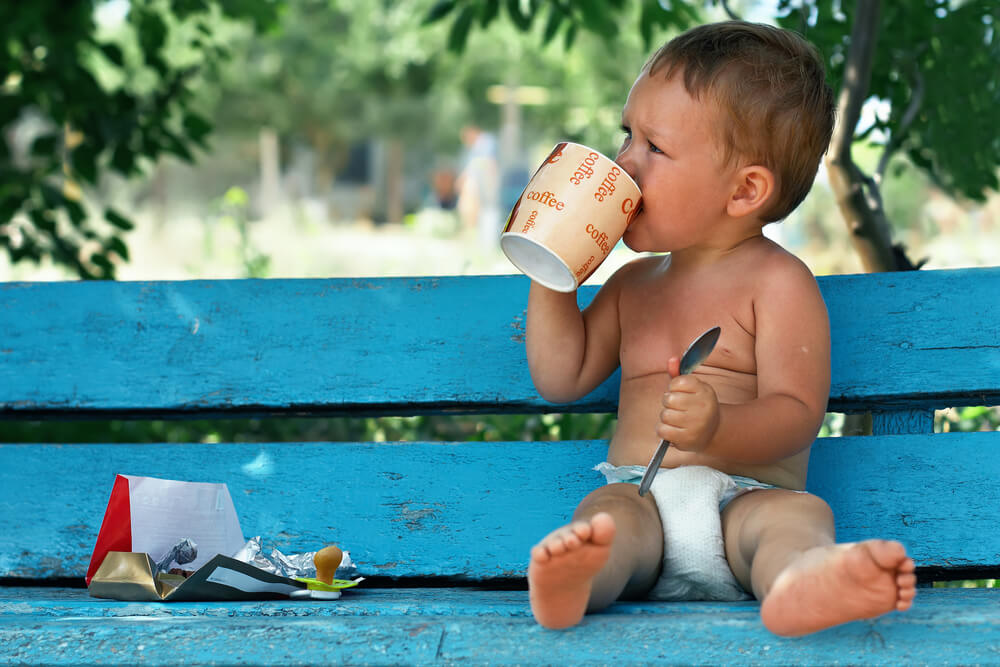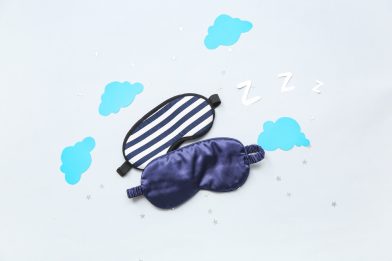Is Coffee Bad for Kids or Not?

As a parent or caretaker, you may wonder, can kids drink coffee? Is it safe for your young ones to indulge in a cup of coffee now and then? However, it is essential to know that the American Academy of Pediatrics (AAP) strictly advises against caffeine consumption for children under 12. The reasoning behind this recommendation lies in caffeine’s impact on developing bodies and minds. Read on to find out a lot more!
Contents:
- How Does Caffeine Affect Children?
- Should Kids Drink Coffee?
- Where to Check for Caffeine?
- Are There Safer Ways for Kids to Drink Coffee? Tips for Parents
- FAQ
How Does Caffeine Affect Children?

Olesia Bilkei/Shutterstock.com
When discussing the impact of caffeine or the benefits of coffee for kids, it is crucial to assess its adverse and positive effects on their physical and mental well-being. Caffeine, commonly found in beverages and foods like coffee, tea, soda, and chocolates, has the potential to boost alertness and improve cognitive performance in children.
It may aid in enhancing a child’s focus and attentiveness, particularly during tiresome bouts of homework or competitive events. However, excessive caffeine consumption can lead to an array of negative consequences, including sleep disturbances, increased anxiety, irritability, and difficulty concentrating.
Moreover, it may exacerbate existing health conditions such as ADHD, cause a neurological deficit such as speech disorder, and increase the likelihood of high blood pressure or heart palpitations. Therefore, while minimal caffeine intake might offer certain advantages to children, weighing these benefits against the potential risks and carefully monitoring their caffeine consumption for a balanced approach to their overall health is essential.
Should Kids Drink Coffee?

boonchoke/Shutterstock.com
The question of whether or not young children should drink coffee has been up for debate for a long time.
Caffeine has not proved to be safe for children under the age of 12. As per medical guidelines, the recommended daily limit for teens is 100 milligrams of caffeine, which is equal to a single cup of coffee.
Thus, considering various factors before introducing coffee into a child’s diet is essential. Such factors include cultural traditions, individual sensitivity to caffeine, and a child’s diet play a significant role in making this decision.
People suggesting a moderate introduction of coffee often encourage waiting until the teen years and maintaining a limit of one cup per day to reduce potentially harmful health effects. Paying attention to these aspects and consulting a healthcare professional can guide parents in making an informed decision about when to introduce coffee to their child’s routine.
| Source | Research results |
| National Library of Medicine National Center for Biotechnology Information | In several studies, regular, high caffeine intake (> 450 mg/day) is usually linked to an increased risk of cardiovascular disease (CVD). (Greenland, 1993; Panagiotakos et al., 2003). |
| Columbia University Irving Medical Center | “Caffeine-containing foods and beverages can have effects on the body and mind that interfere with every aspect of what children need to thrive.” David Buchholz, MD (Columbia Pediatrician). |
| American Academy of Child & Adolescent Psychiatry | Many young people, including young children, require emergency care each year due to consuming caffeine. Vomiting, high blood pressure, a racing heart, issues with the heart’s rhythm, and, less frequently, confusion and hallucinations, are all signs of caffeine overdose. |
⠀
Take care not only about the health, but also about the safety of the child — install the Findmykids app to always know where your child is and what is happening around them.
How Much Coffee Is OK for Kids?
While the aAP generally does not advocate for children to drink coffee, Canada has some regulations that limit the amount of caffeine consumed by children based on age. To follow these rules or not is the decision of the parents and family doctor:
- Ages 4–6: 45 mgs
- Ages 7–9: 62.5 mgs
- Ages 10–12: 85 mgs
- Adolescents (12 and up): 85 – 100 mgs
Where to Check for Caffeine?

kornnphoto/Shutterstock.com
Did you know that caffeine can be found in your favorite tea and various other products? If you wish to monitor caffeine consumption, it’s essential to be aware of these hidden sources.
While coffee beans and tea leaves are considered natural sources of caffeine, it may surprise some that they can also be found in chocolate, energy drinks, and even certain medications such as pain relievers, weight loss supplements, and cold remedies.
Additionally, parents must check the labels of their family’s favorite snacks and beverages, as manufacturers often add caffeine to enhance flavor and provide an energy boost.
If you have caffeine sensitivity, it’s a good idea to familiarize yourself with how caffeine can be concealed in goods, especially those marketed as healthy and natural.
Carefully observe the following labels before buying:
| Ingredient Name on Food Label | Ingredient Synonym |
| Coffee Beans | Caffea sp., green coffee extract, coffee extract |
| Cocoa | Cacao, Theobroma cacao, chocolate, cocoa nibs |
| Green Tea | Camellia Sinesis, green tea extract |
| Black Tea | Camellia Sinesis, black tea extract |
| White Tea | Thea Sinesis, Camellia |
| Kola Nut | Cola Seeds, natural cola flavor |
⠀
Are There Safer Ways for Kids to Drink Coffee? Tips for Parents

VGstockstudio/Shutterstock.com
With children consuming coffee in ever-increasing numbers, parents are bound to ponder, is coffee bad for kids? Thus, they need to be aware of the potential risk factors and equip themselves with the proper knowledge to make informed decisions about children and coffee consumption. While children have different tolerances when it comes to coffee drinking, there are some tips you can use as a parent to ensure your children’s consumption is kept safe and healthy.
Often, Youngsters witness their parents and peers consume caffeine, as well as various advertisements for caffeinated products on a variety of platforms. It is ideal for parents to teach their kids how to read food and drink labels as well as identify familiar caffeine sources.
- Dilute coffee drinks with milk or make sure their servings are small and gradual so their bodies can adjust over time.
- Ensuring that flavored coffees containing too much sugar are avoided is vital for children prone to over-stimulation by sweet drinks.
- Limiting children’s access to highly caffeinated lattes and other more advanced types of espresso-based beverages should be done as part of effective parenting and guidance when it comes to children’s coffee consumption.
- See your child’s doctor, child psychiatrist, or mental health specialist if you have concerns about your child consuming caffeine to determine whether more intense support or advice is required.
- Discussing your child’s caffeine consumption will help you better understand their perceptions of its advantages and disadvantages.
FAQ

brizmaker/Shutterstock.com
At what age is caffeine OK?
Generally, medical professionals recommend that children under the age of 12 should abstain from caffeine consumption, and its intake should be limited even for adolescents aged 12 to 18.
Can a 10-year-old drink coffee?
No. The majority of health experts caution against children drinking coffee because it contains caffeine, a stimulant that can affect their overall development.
Is coffee bad for kids under 15?
Yes. Due to the potential risks and minimal benefits, it’s recommended that parents avoid introducing coffee to kids under 15.
Can a 12-year-old drink coffee?
No. While there are no legal restrictions on children drinking coffee, it is generally not recommended due to the potential health risks including hyperactivity.
Can a child get addicted to caffeine?
Yes. While it may seem far-fetched, children can indeed become addicted to caffeine. Caffeine can stimulate the central nervous system, leading to a sense of temporary alertness and energy.

Halfpoint/Shutterstock.com
Ultimately, it’s up to each parent to decide whether their child should occasionally consume caffeinated beverages such as coffee or soda. The consensus among health professionals is that children should avoid caffeine altogether due to its potentially harmful effects on developing bodies and brains; however, moderate consumption may have some benefits, which may make occasional consumption acceptable, depending on each individual situation. Ultimately, parents must weigh all of the factors before making a decision about their child’s caffeine intake; but as a general rule of thumb, moderation is key.
Do share your coffee experiences and feedback on our article in the comments below. Also, we would love it if you’d share your parenting tips with us.
The picture on the front page: MNStudio/Shutterstock.com
Проверьте электронный ящик



















